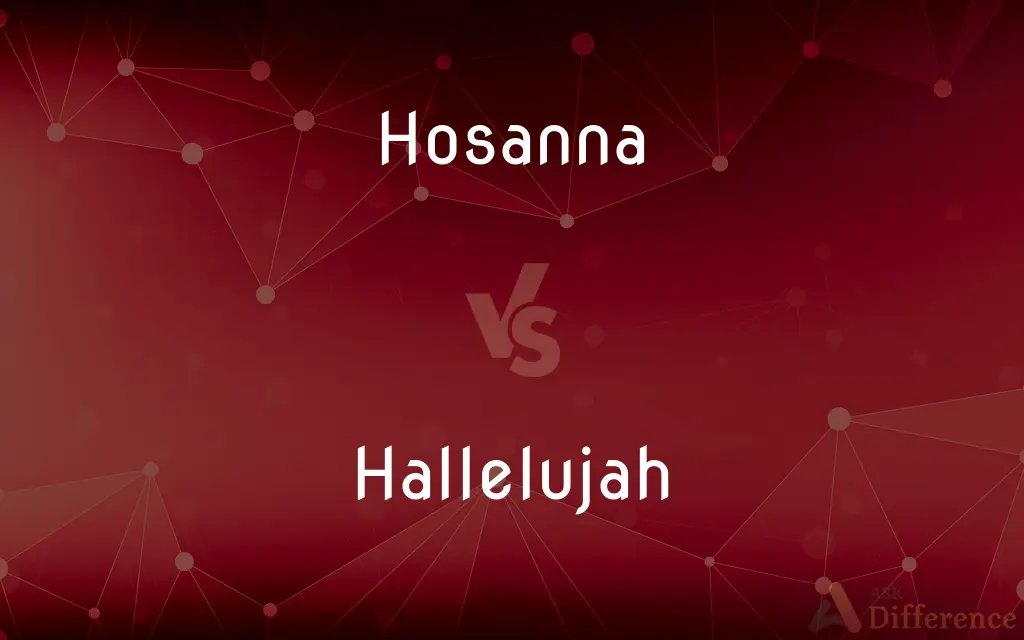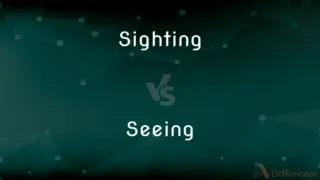Hosanna vs. Hallelujah — What's the Difference?
By Fiza Rafique & Maham Liaqat — Updated on April 8, 2024
Hosanna is a cry for salvation, while Hallelujah is an expression of praise and joy.

Difference Between Hosanna and Hallelujah
Table of Contents
ADVERTISEMENT
Key Differences
Hosanna, originally from Hebrew, means "save, please" and is used in religious contexts as a plea for salvation or help. It is often associated with Palm Sunday, commemorating Jesus' entry into Jerusalem, where crowds laid palm branches and shouted "Hosanna!" On the other hand, Hallelujah, also of Hebrew origin, translates to "Praise the Lord" and is used as an expression of joy, praise, or gratitude, especially in worship settings. It is found in many Psalms and has become a staple in Christian, Jewish, and other religious hymns and prayers.
While Hosanna carries a connotation of supplication and a desire for deliverance, Hallelujah is purely an exclamation of worship and thanksgiving towards God. This difference highlights the contexts in which each is used: Hosanna for moments of seeking divine intervention, and Hallelujah for moments of celebrating divine presence or blessings.
The usage of Hosanna has evolved. Initially, it was a plea for salvation, but in Christian liturgy, it has also come to express joy and praise for the salvation believed to have been brought by Jesus Christ. Conversely, Hallelujah has maintained a consistent use across various religions as a joyous praise, without the connotation of supplication that accompanies Hosanna.
In liturgical music, Hosanna and Hallelujah serve different purposes. Hosanna is typically used in Advent and Lent, periods of preparation and reflection on salvation history. Hallelujah is prominent in Easter and other celebrations, symbolizing the joy of resurrection and the fulfillment of God's promises.
Both terms, despite their different implications, play significant roles in religious traditions, embodying the spectrum of human interaction with the divine—from plea for help to expressions of ecstatic joy.
ADVERTISEMENT
Comparison Chart
Meaning
"Save, please"
"Praise the Lord"
Origin
Hebrew
Hebrew
Context
Supplication, plea for salvation
Joy, praise, thanksgiving
Liturgical Use
Advent, Lent, Palm Sunday
Easter, celebrations, general worship
Connotation
Desire for divine intervention
Expression of worship and joy
Compare with Definitions
Hosanna
A term of adoration and appeal for deliverance.
Hosanna is often sung during times of reflection on salvation history.
Hallelujah
Found in Psalms and hymns as an expression of praise.
The Psalmist writes, Sing Hallelujah, praise the Lord!
Hosanna
Used in Christian liturgy to express joy for Jesus' perceived role as savior.
The palm branches waved, and Hosanna filled the air.
Hallelujah
Used in celebrations and religious ceremonies as an expression of joy.
Easter services often conclude with resounding Hallelujahs.
Hosanna
A cry for help, with religious undertones.
Hosanna in the highest, the choir sang, echoing the biblical plea.
Hallelujah
An exclamation of worship and gratitude.
Hallelujah! the crowd rejoiced, celebrating their faith.
Hosanna
A plea for salvation, often used in religious contexts.
The congregation sang Hosanna as they welcomed the advent season.
Hallelujah
Symbolizes the fulfillment of God's promises.
The chorus of Hallelujah at the service reminded everyone of divine faithfulness.
Hosanna
Associated with Palm Sunday and Jesus' entry into Jerusalem.
Children reenact Jesus' arrival in Jerusalem, shouting Hosanna.
Hallelujah
A universal term of joy and praise in many religions.
The melody of Hallelujah resonated across the congregation.
Hosanna
Hosanna () is a liturgical word in Judaism and Christianity. It refers to a cry expressing an appeal for divine help.
Hallelujah
Hallelujah ( HAL-i-LOO-yə) is an interjection used as an expression of gratitude and adoration. It is a transliteration of the Hebrew phrase הַלְלוּ יָהּ (Modern Hebrew hallūyāh, Tiberian haləlūyāh), which means to praise Jah (from הַלְלוּ, "praise;" and יָהּ, Jah.) The word hallel in Hebrew means a joyous praise in song.
Hosanna
(especially in biblical, Judaic, and Christian use) used to express adoration, praise, or joy
‘Hosanna, blessed is he who comes in the name of the Lord.’
Hallelujah
Used to express praise or joy.
Hosanna
An expression of adoration, praise, or joy
The soundtrack evoked passionate hosannas from some critics
Hallelujah
An exclamation of "hallelujah."
Hosanna
Used to express praise or adoration to God.
Hallelujah
(Music) A composition expressing praise and based on the word "hallelujah."
Hosanna
A cry of "hosanna."
Hallelujah
(by extension) A general expression of gratitude or adoration.
Hallelujah! It’s finally the weekend!
Hosanna
A shout of fervent and worshipful praise.
Hallelujah
A shout of “Hallelujah”.
Hosanna
A cry of praise or adoration to God in liturgical use among the Jews, and said to have been shouted in recognition of the Messiahship of Jesus on his entry into Jerusalem; hence since used in the Christian Church.
Hallelujah
(music) A song of praise to God; a musical composition based on the word "Hallelujah".
Hosanna
A cry of ‘hosanna’.
Hallelujah
(in the plural) General praise.
Hosanna
(intransitive) To give a cry of ‘hosanna’.
Hallelujah
(intransitive) To cry "hallelujah" in praise.
Hosanna
A Hebrew exclamation of praise to the Lord, or an invocation of blessings.
Hosanna to the Son of David.
Hallelujah
A shout or song of praise to God
Hosanna
A cry of praise or adoration (to God)
Common Curiosities
What does Hosanna mean?
Hosanna means "save, please" and is a plea for salvation or help.
Can Hosanna and Hallelujah be used interchangeably?
No, they serve different purposes: Hosanna is a plea for salvation, while Hallelujah is an expression of praise.
Why is Hallelujah particularly associated with Easter?
It symbolizes the joy and victory of the resurrection of Jesus, marking the fulfillment of God's promise.
Why is Hosanna associated with Palm Sunday?
It commemorates Jesus' entry into Jerusalem, where crowds shouted "Hosanna" as a plea for salvation.
How is Hallelujah used in worship?
Hallelujah is used as an expression of joy, praise, and thanksgiving, often found in hymns and prayers.
What does Hallelujah translate to?
Hallelujah translates to "Praise the Lord."
How do the meanings of Hosanna and Hallelujah reflect different religious sentiments?
Hosanna reflects a sentiment of supplication and desire for salvation, whereas Hallelujah reflects joy and gratitude.
Are there specific times when Hosanna is sung in church?
Yes, Hosanna is often sung during Advent, Lent, and especially on Palm Sunday.
Can Hosanna be a form of praise?
Yes, while it is a plea for salvation, in Christian liturgy, it has also come to express joy and praise for the salvation brought by Jesus.
Is Hallelujah specific to Christianity?
No, Hallelujah is used in Jewish worship and by other faiths as well, signifying its broad religious significance.
Is there a biblical basis for using Hosanna and Hallelujah in worship?
Yes, both terms are found in the Bible, with Hosanna in the New Testament and Hallelujah in the Old Testament Psalms.
Do other religions besides Christianity use Hallelujah?
Yes, Judaism, for instance, uses Hallelujah in Psalms and other prayers.
How do the liturgical uses of Hosanna and Hallelujah differ?
Hosanna is used in times of preparation and reflection, while Hallelujah is used in times of celebration and joy.
What role does music play in the use of Hosanna and Hallelujah?
Music enhances the emotional and spiritual expression of both terms, with Hosanna often set to more solemn tunes and Hallelujah to joyful melodies.
How do Hosanna and Hallelujah enrich religious practice?
They provide language for the full range of human religious experience, from pleas for divine intervention to expressions of ecstatic praise.
Share Your Discovery

Previous Comparison
Sighting vs. Seeing
Next Comparison
Alley vs. ValleyAuthor Spotlight
Written by
Fiza RafiqueFiza Rafique is a skilled content writer at AskDifference.com, where she meticulously refines and enhances written pieces. Drawing from her vast editorial expertise, Fiza ensures clarity, accuracy, and precision in every article. Passionate about language, she continually seeks to elevate the quality of content for readers worldwide.
Co-written by
Maham Liaqat















































